Broken Spoke Is Counting on a City Hall Two-Step to Protect Its Future
By Corey Smith
Reporting Texas
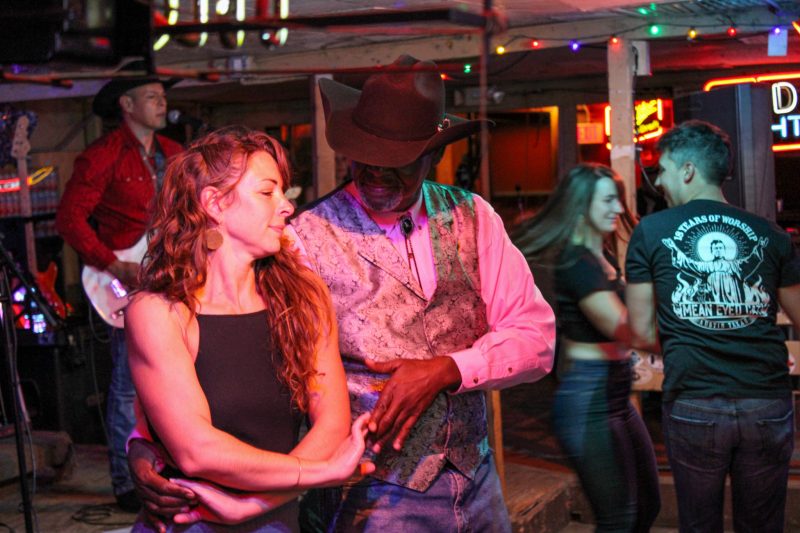
Jessica Vanness, left, and Tim Caldwell dance to music by The Stateline Band at the Broken Spoke in Austin, Texas. The dance hall, which draws a number of regulars like Caldwell, sits on a lot that could be designated a historic zone. Corey Smith/Reporting Texas
The Broken Spoke faces a critical turning point this spring, as the Austin City Council considers designating the lot surrounding the Texas dance hall as a historic zone, a declaration that would protect the 58-year-old venue from real estate development along South Lamar Boulevard.
In November, the council initiated a proclamation naming the Broken Spoke a historical landmark. But that largely ceremonial proclamation, brought by Council Member Ann Kitchen, in itself does not ensure long-term preservation of the dance hall and restaurant. So, Kitchen initiated the city’s historic zoning process that would make it more difficult for the landowner to develop the Broken Spoke site.
“She didn’t want it to go the way of so many other historic landmarks unofficially named in town, one of them being Threadgill’s,” said Donna Marie Miller, author of the 2017 book, The Broken Spoke: Austin’s Legendary Honky-Tonk. “She wanted it to be here for future generations. So she started the process.”
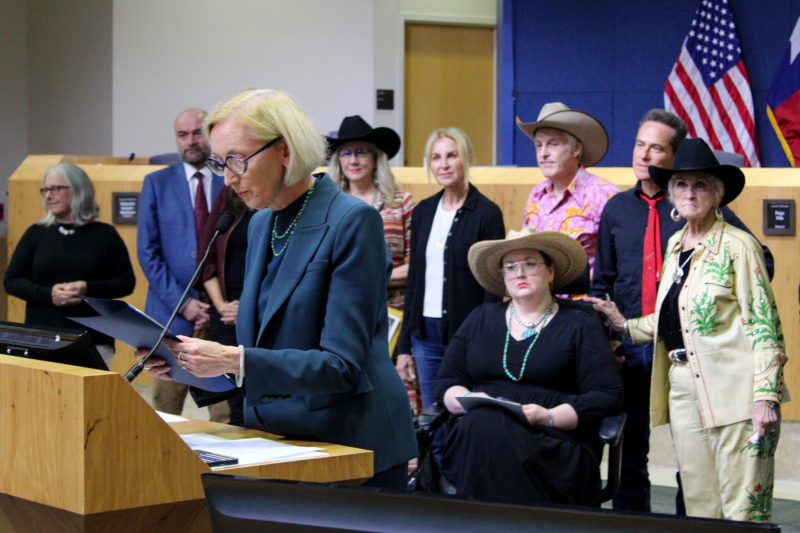
Austin City council member Ann Kitchen reads a ceremonial proclamation to name the Broken Spoke a historical landmark on Nov. 3, 2022. “It is hard to imagine what Austin would be today without the influence contributed by the Broken Spoke to our shared history and music culture,” Kitchen said. Corey Smith/Reporting Texas
But Kitchen, who is retiring, will no longer be on the council by the time it votes in the spring. Mayor Steve Adler, a fellow Broken Spoke supporter, will also be out of office by then, and three new City Council members and a new mayor will help to decide the fate of the Broken Spoke.
“It’s 100% critical,” said Broken Spoke general manager Ginny White-Peacock, daughter of the dance hall’s founders, James and Annetta White.
While the White family retains ownership over the business, making it the longest continuously single-family-owned honky-tonk in the world, according to Miller, the family does not own the land on which the building stands.
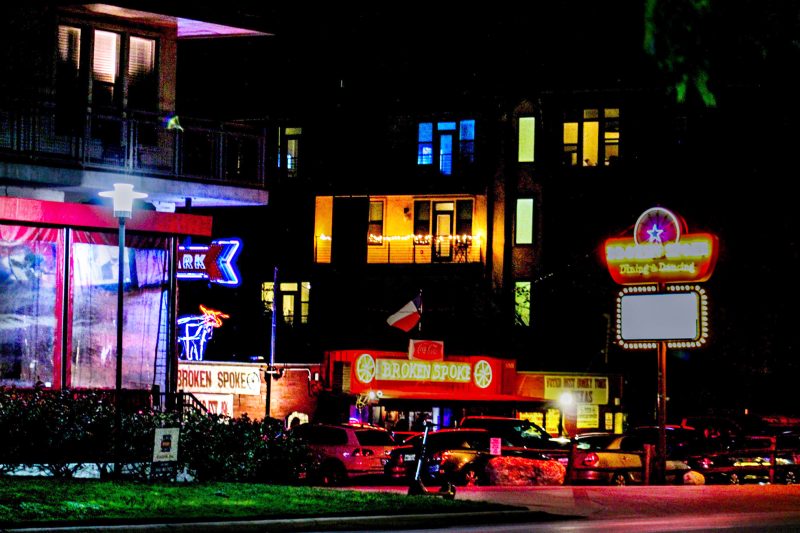
Neon signs illuminate the Broken Spoke which is bookended by apartments on either side. The Austin real estate boom has presented an existential threat to many cultural landmarks around the city. Corey Smith/Reporting Texas
From its inception, the Broken Spoke has operated at the center of a three-parcel property. Within the past decade, multi-story luxury apartment buildings on either side of the venue have gone up. Transwestern, a commercial real estate company which oversaw the 2013 construction of the apartments while maintaining a strong relationship with the White family, has since transferred land ownership to CWS Apartments, a corporate group with which White-Peacock says her family has yet to establish an equally amicable bond.
“The problem with CWS is it’s a very large company,” said White-Peacock. “Those guys that were in charge of Transwestern, they were Broken Spoke fans. They would come in, I’m still friends with a couple of them on Facebook. They were bigger fans, or they understood it better. And so we do worry about CWS understanding that, you know, it’s super important. Unfortunately they have like a hundred members on their board and they only meet twice a year, and trying to get them to vote on something might be hard.”
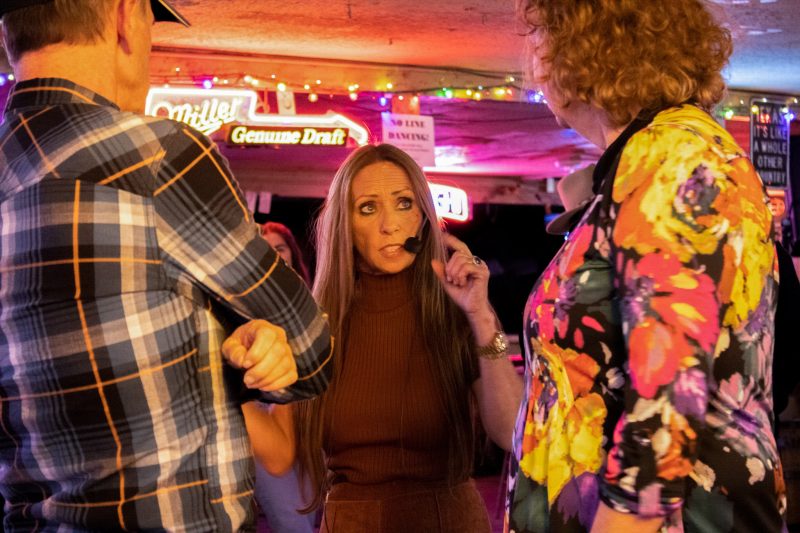
Terri White, one of James and Annetta White’s daughters, coaches a dancing pair during a two-step lesson. White has instructed country dance lessons at the Broken Spoke for more than 14 years. Corey Smith/Reporting Texas
White-Peacock says the Broken Spoke has four years remaining on its current lease with CWS. “A renewal is not certain at all,” she said.
CWS has not said whether it will support or oppose historic zoning for the site. CWS did not respond to multiple requests for comment from Reporting Texas.
Kimberly Collins, senior planner for the city’s historic preservation office, said that a historic zoning designation would not directly affect lease agreements between a tenant and a landowner. However, there are financial incentives tied into such a designation that could make a landowner more amenable to ensuring preservation of a landmark like the Broken Spoke, with one such benefit being a partial tax abatement.
Such a perk may also provide additional financial flexibility for the venue itself, enabling the Broken Spoke to invest in a series of building upgrades.
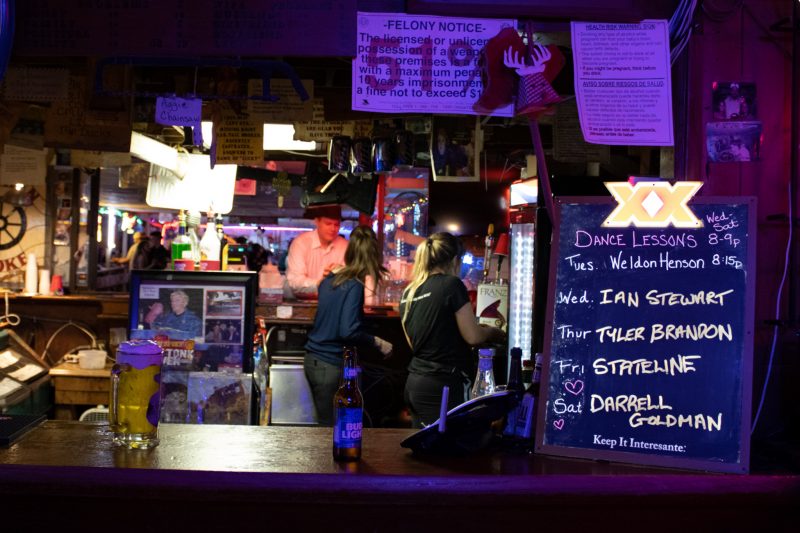
The Broken Spoke’s bar, which needs upgrading, is one of the areas that would benefit from financial incentives tied to a historical zoning designation. Corey Smith/Reporting Texas
“Anybody who has stepped inside can see that it’s the original wiring, the original plumbing, and the original bathrooms,” said Miller. “Of course, that bar is widely used every weekend. We do have the back bar that we can visit if the front bar gets busy. But it really needs some upgrades that would not change the looks of the place.”
The city said that if historical zoning designation were granted, any proposal to replace elements on the exterior of the building, or any initiatives to relocate or demolish a historically-zoned building would first require historic review and approval.
Kitchen’s chief of staff, Donna Tiemann, said any path toward establishing these types of protections would become smoother if the property owner supports the historical zoning designation bid.
“The White family at this time is really not involved in the research that the City Council is doing,” said Miller. “It all comes from Ann Kitchen, but they certainly hope that whoever votes on this in the spring to make this a landmark will help support and maintain the Broken Spoke that we’ve come to know and love.”
If CWS were to support the motion, standard Austin City Council voting requirements would apply — meaning a six-vote simple majority would be required on any first attempt at passing the resolution, seven votes were the proposal to require more than one reading and nine votes if a three-fourths vote were to be required.
Should the property owner object, however, a supermajority vote would be required from the Historic Landmark Commission to advance the case to the Land Use Commission, per state law. A nine-vote supermajority would also be required from the Austin City Council.
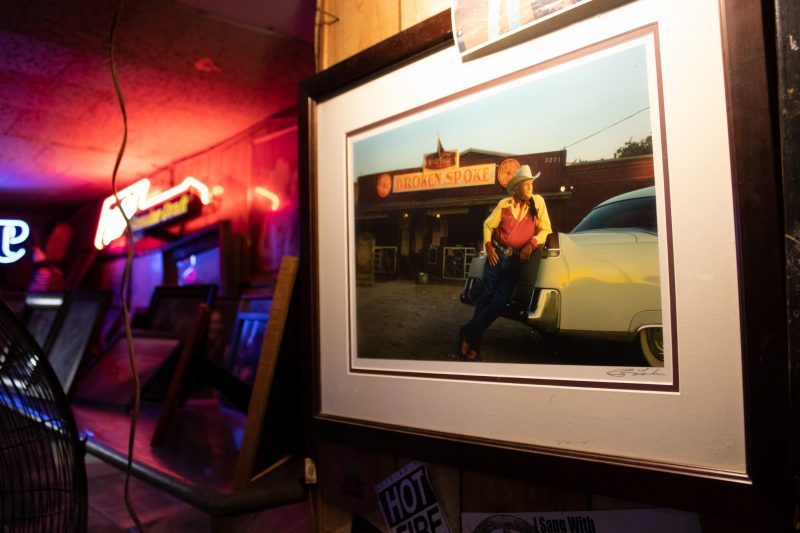
A photo of Broken Spoke founder James White, who with the help of friends, built the place by hand, adorns the dance hall. Corey Smith/Reporting Texas
For Austinites and tourists alike, much of the allure resides in the Broken Spoke’s fairy tale origin story. Miller said that the very day South Austin native James White got out of the Army, he was driving down South Lamar Boulevard, then a mile outside of Austin city limits, when he saw a “Land for Lease” sign. White wrote down the number from the sign, found the nearest pay phone and called Jay Johnson, then-owner of the land on which the Broken Spoke now stands.
White, enlisting a number of his friends, constructed the Broken Spoke by hand and subsequently opened the venue to the public in November 1964. White and his wife Annetta owned and operated the dance hall for more than 56 years, before James White’s death in January 2021.
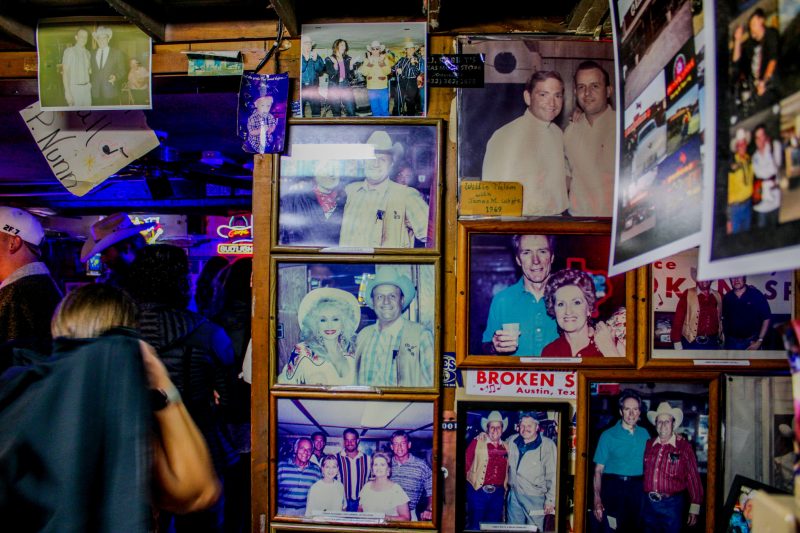
Photos of celebrities such as Dolly Parton, Willie Nelson, Clint Eastwood and Troy Aikman, dot the walls of the Broken Spoke which has been visited by countless stars since its founding in 1964. Garth Brooks, whose nine diamond status albums stand as an all-time record, played a surprise show there in 2017. Corey Smith/Reporting Texas
By the time of his death, the Broken Spoke had developed into a staple of Austin music culture and a world famous venue for country music, hosting performers such as Dolly Parton, Willie Nelson, George Strait and Garth Brooks. The dance hall and restaurant has remained virtually unchanged over the years.
“This place really and truly was built by a bunch of Mr. White’s friends that were paid in free drinks,” said Miller, who worked as a music reporter for part of her nine-year career as a Texas-based journalist. “It’s got the low ceiling, it’s got the wooden porches, and it really is unchanged from when I first stepped inside in 1982. And I think that people like that. They see this as a real bonafide honky-tonk.”
The Broken Spoke has remained resilient in recent years, paying $20,000 monthly rental costs without any significant form of income during the early stages of the COVID-19 pandemic just to remain open, according to White-Peacock. It’s yet another example, she says, that the business is deserving of the city’s endorsement.
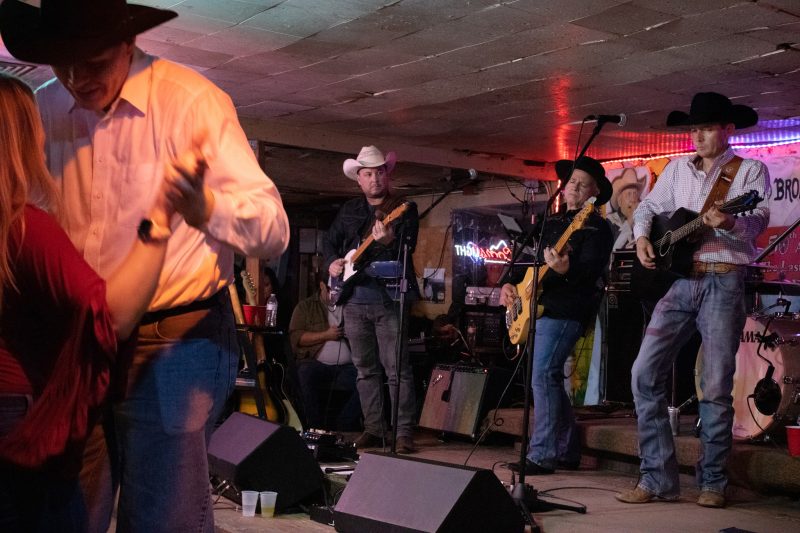
The Stateline Band’s Jeff James, from left, Scott Zajicek and Jody Dominguez perform at the Broken Spoke on Nov. 11, 2022. Corey Smith/Reporting Texas
“We need the city to help us out so we can keep staying. We want to stay where we are, we want to keep the business going,” said White-Peacock. “It was my dad’s dream and we don’t want it to go away, but we do need help from somebody or it will go away.”
“The city helps out Samsung. They help out all these others, Tesla, and all these other big companies, which is fine. But the small businesses like the Broken Spoke, that are so unique, they’re important too,” she continued. “And that’s what keeps your culture alive.”